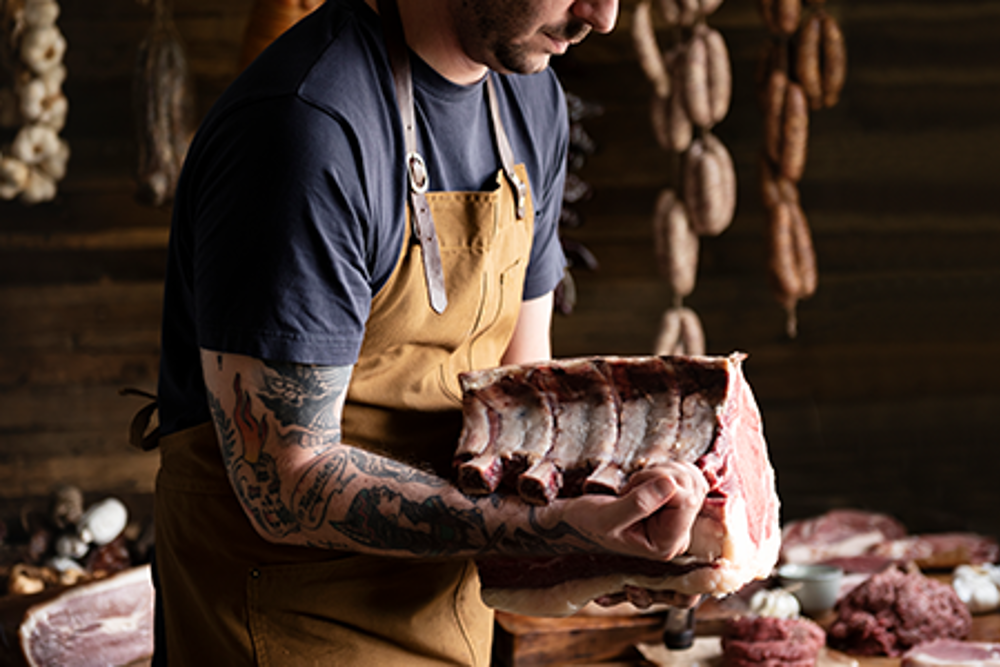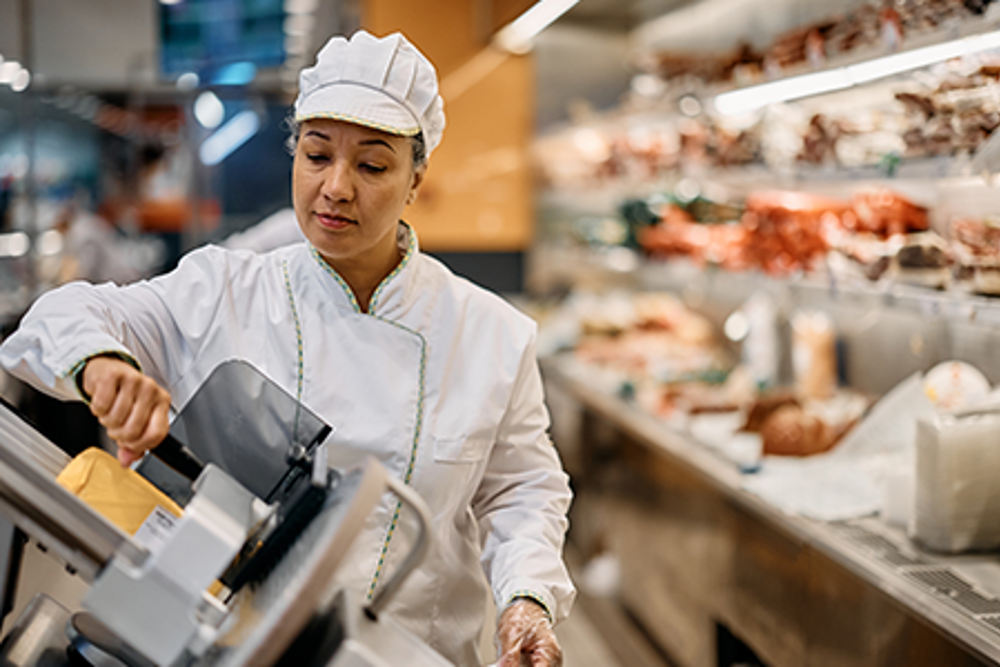Start a butchery apprenticeship



According to Labour Market Insights, full-time butcher employment in Australia is expected to increase by 11.2 per cent by 2026. If you’re considering starting a career in this growing industry, an apprenticeship in meat processing is the way to make it happen.
Get a rundown of the meat processing industry as we explore what butchery is, what you can expect from a butchery career and how you can begin an apprenticeship butchery course at SWTAFE.
What is a butcher?
A butcher is a person who specialises in preparing and selling meat. They are responsible for selecting, cutting, packaging and pricing cuts of beef, pork, poultry and lamb sold in grocery stores or butcher shops. Butchers typically acquire the animals from local farms before properly trimming off the fat and sawing the flesh into individual portions that can then be packaged according to customer needs.
You might be surprised to know that many types of butchers exist. From retail-based to halal-approved, there are many directions one can go. We’ll run you through the different kinds of butchery you may encounter.
- Retail Butcher
A retail butcher works in supermarkets, specialty stores and grocery shops, selling fresh meats to customers. - Industrial Butcher
An industrial butcher is employed by a processor or company that supplies packaged meat primarily for restaurant supply chains and other large-scale buyers of bulk quantities of meat. This type includes traditional butchery and modern machinery-based production. - Halal Butcher
A Halal butcher works in a shop specialising in selling meat slaughtered according to Islamic law. Halal butchers usually provide customers with fresh meat from farm-raised livestock using humane slaughter practices. - Kosher Butcher
A Kosher butcher is a person certified to prepare meat according to the kashrut laws, including ritual slaughter, proper filleting and cleaning. Kosher butchers only sell specific cuts of meat deemed acceptable by Jewish dietary rules. - Nose-to-Tail Butcher
A Nose-to-Tail butcher uses every part of an animal, from head to hoof. This means selling cuts and joints which are not generally seen on shop shelves or found pre-packaged at supermarkets.
It also includes utilising lesser know parts such as offal, platform meat (collar/rump) and jelly bones for making stocks, soups and sauces. This gives customers access to cheaper but still nutritious options while reducing waste. - Wild Game Meat Processor
This niche butcher supplies a variety of less popular meats such as venison, kangaroo, goose, rabbit, duck and wild boar. Many of these meats have limited distribution and are only available seasonally. Butchers of these lesser-seen meats have specialised knowledge about each animal’s qualities.
What does a butcher do?
Your daily tasks will differ depending on the type of butchery you specialise in. That said, below are some of the typical daily duties you will complete while working as a butcher:
- Cutting meat into portions according to customer requests
- Operating slicing machines, grinders or saws to cut the pieces of meat
- Keeping a clean workspace, free from contaminants like blood from dripping on floors, cutting boards, and tables
- Weighing out large cuts of meat for customers and wrapping each portion with plastic wrap or wax paper before labelling it
- Replenishing stocks within your designated areas and maintaining stock levels throughout the entire shift duration
- Maintaining employee areas, ensuring all equipment used remains sterile and sanitised.
Being a butcher is an important and demanding profession. Your customers rely on your knowledge and service to use your products daily. Butchery requires knowledge of the various cuts made from different kinds of meat and excellent knife skills to expertly cut it into desired sizes for customers or restaurants.
An experienced butcher will know how long each cut needs to cook for optimal flavour and texture, as well as expertise with tools like band saws or grinders, to break down whole carcasses quickly. If you seek challenges throughout your working day, being a butcher could meet those needs.
Butchering is a great career choice if you enjoy working with your hands and have an interest in the food industry. Butchering can provide job stability, competitive wages, opportunities to showcase creative skillset through custom cuts of meat products and a sense of accomplishment in feeding large numbers of people. Those interested in advancing may find management or ownership positions available within the butchery as operations expand into on-site retail stores or online businesses.
Valuable butcher skills
If you’re considering becoming a butcher, these personal skills will come in handy when applying for roles and entering this fast-moving industry.
- Commitment to safety
Being able to work safely and efficiently is crucial for a butcher because often, you need to manage your time while keeping an eye on quality control. You must move quickly without compromising safety. - Dexterity
It’s a major bonus to have nimble hands when cutting meat. If you use skilful carving techniques, this helps maintain shapely portions. - Communication skills
Good communication allows you to deal effectively with customers and suppliers. - Interpersonal skills
Collaborating with colleagues, suppliers, and management will make the workplace more pleasant.
How to become a butcher
The most direct route to becoming a butcher in Australia is an apprenticeship. Apprenticeships involve completing up to four years of on-the-job training, learning knife skills and meat processing techniques, and developing customer service and retailing knowledge with an approved employer.
Once you’ve completed an apprenticeship qualification through a provider such as South West TAFE, you can become qualified for full registration status with The Australian Meat Industry Council (AMIC), which certifies butchers throughout Australia.
Study a meat processing course at SWTAFE
If you’re on board and ready to start your journey to becoming a butcher, South West TAFE offers two courses that you can take to get qualified.
Certificate II in Meat Processing (Food Services) (Traineeship) (AMP20117)
This course is perfect if you want to make your start in the meat industry. This Certificate II program will teach you all the essential skills needed to qualify for work in a meat processing setting. This traineeship will enable you to earn while you learn.
Upon completion of the course, you’ll be qualified to apply for roles such as:
- butcher shop customer service worker
- meat department customer service worker
- delicatessen assistant
- meat wholesale preparation worker
- meat wholesale packer/wrapper/slicer
Certificate III in Meat Processing (Retail Butcher) (Apprenticeship) (AMP30815)
If you dream of becoming a retail butcher, this is the course for you. As an apprentice in this course, you will learn all the skills relating to the cutting, pricing, displaying and selling of meat to the public. Once completed, you’ll be qualified to work as a retail or supermarket butcher. You could even start your own butcher shop business.
Find a butcher apprenticeship
Starting a butcher apprenticeship is the way to go if you want to enter the meat industry. Apprenticeships are the perfect way to learn in a workplace setting, preparing you for the job's realities. If you’re unsure how to secure an apprenticeship, start by checking online job sites for butchers looking to take on apprentices in your area. You can also speak with your local butcher about any opportunities for apprentice or traineeship positions in their business. If you have questions about securing an apprenticeship, feel free to reach out to South West TAFE’s Skills and Jobs Centre.
Average butcher salary
According to Seek.com.au, butchers make between $65,000 and $75,000 per year in Victoria. However, the yearly salary of a butcher will depend on location, experience and if you work in any specialised butchery. Apprentice butchers generally earn an average of $45,148 per year.
Butchering is an attractive and exciting field of work. You’ll need to complete your apprenticeship at your local butcher or supermarket and complete the training through an accredited training organisation like South West TAFE. With many resources to help you secure an apprenticeship, such as South West TAFE's Skills and Jobs Centre, you can start your journey towards achieving the competitive wages and job stability this industry offers. Start your journey to becoming a butcher by contacting SWTAFE today!